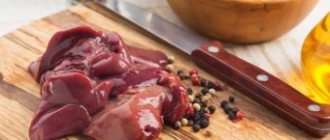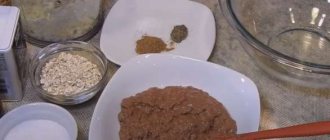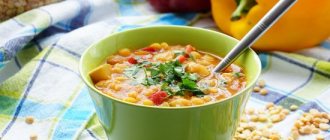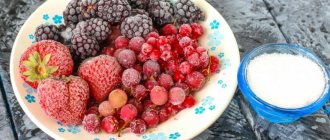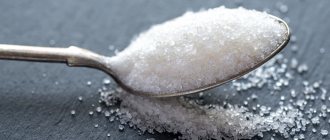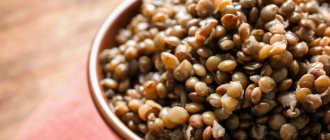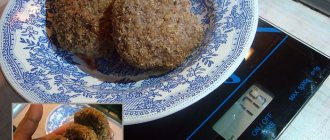How many calories:
=78 kcal.
There are 78 calories in Chicken Noodle Soup with Broth. per 100 grams.
You can use different parts of chicken for chicken noodles. If you use only skinless breasts, you can reduce the fat content of the broth, while the calorie content of the dish will decrease by 15 kcal per 100 grams. The noodles can be homemade or any purchased noodles (horns, spider webs, stars), the calorie content of the soup will not change significantly. 100 grams of the product “Chicken noodle soup in broth” contains:
- Water - 54 g;
- Chicken - 22 g;
- Potatoes - 11 g;
- Carrots - 5 g;
- Dry pasta - 5 g;
- Onion - 3 g;
Composition of nutrients, BJU
Chicken noodle soup with broth
| For quantity: 100 grams | ||
| Calories — 78 | Calories from fat - 25 | |
| BJU | ||
| Total fat content | 2.78g | |
| Saturated | 0.75g | |
| Polyunsaturated | 0.61g | |
| Monounsaturated | 1.08g | |
| Cholesterol | 21mg | |
| Total carbohydrate content | 6.6g | |
| Dietary fiber | 0.66g | |
| Sugar | 0.45g | |
| Squirrels | 6.37g | |
| Vitamins and microelements | ||
| A - 54.98 µg | C - 8.7 mg | |
| B-6 – 0.13 mg | B-12 – 0.14µg | |
| D - 0.02 µg | E - 0.11 mg | |
| Calcium 12mkg | Iron 0.62mg | |
| Magnesium 11.67 mg | Zinc 0.54 mg | |
| Potassium 131 mg | Sodium 39 mg | |
Distribution of calories for BJU:Carbohydrates (36%) Fats (32%) Proteins (32%) | ||
How many calories are in chicken noodle soup?
Here's how much:
The simplest soup recipe:
Ingredients:
- Chicken fillet – 500 gr. — (550 kcal)
- Potatoes – 250 gr. — (200 kcal)
- Carrots – 70 gr. — (22 kcal)
- Onions – 50 gr. — (20 kcal)
- Noodles – 200 gr. — (644 kcal)
- Vegetable oil – 3 tbsp. spoons - (456 kcal)
- Water – 3 l. — (0 kcal)
- Bay leaf – 2 pcs. — (0 kcal)
- Ground black pepper – to taste – (0 kcal)
- Salt - to taste - (0 kcal)
We wash the chicken fillet under running water, put it in a pan and fill it with water. Peel one carrot and one onion and place in the pan without cutting. Bring to a boil, skim off the foam and cook the chicken fillet with vegetables over low heat for about 40 minutes. Don’t forget to add salt and pepper to taste.
Remove the chicken and vegetables from the pan. The meat needs to be cut into small pieces and thrown into the broth along with the diced potatoes. Peel and wash the remaining onions and carrots. Finely chop the onion, grate the carrots on a coarse grater and fry it all until golden brown. Place the roast and noodles into the broth and cook for 8-10 minutes. The soup is ready.
Based on this recipe:
Calorie content of chicken noodle soup, per 100 grams, is:
Recipe Noodles with chicken. Calorie, chemical composition and nutritional value.
Nutritional value and chemical composition of “Chicken Noodles”.
The table shows the nutritional content (calories, proteins, fats, carbohydrates, vitamins and minerals) per 100 grams of edible portion.
| Nutrient | Quantity | Norm** | % of the norm in 100 g | % of the norm in 100 kcal | 100% normal |
| Calorie content | 176.4 kcal | 1684 kcal | 10.5% | 6% | 955 g |
| Squirrels | 9.7 g | 76 g | 12.8% | 7.3% | 784 g |
| Fats | 2.2 g | 56 g | 3.9% | 2.2% | 2545 g |
| Carbohydrates | 29 g | 219 g | 13.2% | 7.5% | 755 g |
| Alimentary fiber | 0.5 g | 20 g | 2.5% | 1.4% | 4000 g |
| Water | 57.6 g | 2273 g | 2.5% | 1.4% | 3946 g |
| Ash | 0.532 g | ~ | |||
| Vitamins | |||||
| Vitamin A, RE | 117.6 mcg | 900 mcg | 13.1% | 7.4% | 765 g |
| beta carotene | 0.69 mg | 5 mg | 13.8% | 7.8% | 725 g |
| Vitamin B1, thiamine | 0.055 mg | 1.5 mg | 3.7% | 2.1% | 2727 g |
| Vitamin B2, riboflavin | 0.048 mg | 1.8 mg | 2.7% | 1.5% | 3750 g |
| Vitamin B4, choline | 26.2 mg | 500 mg | 5.2% | 2.9% | 1908 |
| Vitamin B5, pantothenic | 0.551 mg | 5 mg | 11% | 6.2% | 907 g |
| Vitamin B6, pyridoxine | 0.412 mg | 2 mg | 20.6% | 11.7% | 485 g |
| Vitamin B9, folates | 8.522 mcg | 400 mcg | 2.1% | 1.2% | 4694 g |
| Vitamin B12, cobalamin | 0.062 mcg | 3 mcg | 2.1% | 1.2% | 4839 g |
| Vitamin C, ascorbic acid | 86.21 mg | 90 mg | 95.8% | 54.3% | 104 g |
| Vitamin E, alpha tocopherol, TE | 0.397 mg | 15 mg | 2.6% | 1.5% | 3778 g |
| Vitamin K, phylloquinone | 1.7 mcg | 120 mcg | 1.4% | 0.8% | 7059 g |
| Vitamin RR, NE | 2.6105 mg | 20 mg | 13.1% | 7.4% | 766 g |
| Niacin | 3.567 mg | ~ | |||
| Macronutrients | |||||
| Potassium, K | 142.51 mg | 2500 mg | 5.7% | 3.2% | 1754 g |
| Calcium, Ca | 5.12 mg | 1000 mg | 0.5% | 0.3% | 19531 |
| Silicon, Si | 7.586 mg | 30 mg | 25.3% | 14.3% | 395 g |
| Magnesium, Mg | 27.83 mg | 400 mg | 7% | 4% | 1437 g |
| Sodium, Na | 18.42 mg | 1300 mg | 1.4% | 0.8% | 7058 g |
| Sera, S | 69.92 mg | 1000 mg | 7% | 4% | 1430 g |
| Phosphorus, P | 56.1 mg | 800 mg | 7% | 4% | 1426 g |
| Chlorine, Cl | 29.31 mg | 2300 mg | 1.3% | 0.7% | 7847 g |
| Microelements | |||||
| Bor, B | 5.2 mcg | ~ | |||
| Iron, Fe | 0.621 mg | 18 mg | 3.5% | 2% | 2899 g |
| Yod, I | 2.81 mcg | 150 mcg | 1.9% | 1.1% | 5338 g |
| Cobalt, Co | 3.695 mcg | 10 mcg | 37% | 21% | 271 g |
| Lithium, Li | 30 mcg | ~ | |||
| Manganese, Mn | 0.0611 mg | 2 mg | 3.1% | 1.8% | 3273 g |
| Copper, Cu | 58.13 mcg | 1000 mcg | 5.8% | 3.3% | 1720 g |
| Molybdenum, Mo | 4.975 mcg | 70 mcg | 7.1% | 4% | 1407 g |
| Nickel, Ni | 1.724 mcg | ~ | |||
| Selenium, Se | 6.773 mcg | 55 mcg | 12.3% | 7% | 812 g |
| Fluorine, F | 40.84 mcg | 4000 mcg | 1% | 0.6% | 9794 g |
| Chromium, Cr | 9.46 mcg | 50 mcg | 18.9% | 10.7% | 529 g |
| Zinc, Zn | 0.536 mg | 12 mg | 4.5% | 2.6% | 2239 g |
| Digestible carbohydrates | |||||
| Starch and dextrins | 0.034 g | ~ | |||
| Mono- and disaccharides (sugars) | 1.8 g | max 100 g | |||
| Glucose (dextrose) | 0.724 g | ~ | |||
| Sucrose | 0.241 g | ~ | |||
| Fructose | 0.828 g | ~ | |||
| Essential amino acids | 0.113 g | ~ | |||
| Arginine* | 0.546 g | ~ | |||
| Valin | 0.401 g | ~ | |||
| Histidine* | 0.395 g | ~ | |||
| Isoleucine | 0.35 g | ~ | |||
| Leucine | 0.603 g | ~ | |||
| Lysine | 0.804 g | ~ | |||
| Methionine | 0.136 g | ~ | |||
| Methionine + Cysteine | 0.264 g | ~ | |||
| Threonine | 0.344 g | ~ | |||
| Tryptophan | 0.115 g | ~ | |||
| Phenylalanine | 0.33 g | ~ | |||
| Phenylalanine+Tyrosine | 0.607 g | ~ | |||
| Nonessential amino acids | |||||
| Alanin | 0.384 g | ~ | |||
| Aspartic acid | 0.573 g | ~ | |||
| Hydroxyproline | 0.062 g | ~ | |||
| Glycine | 0.272 g | ~ | |||
| Glutamic acid | 0.836 g | ~ | |||
| Proline | 0.299 g | ~ | |||
| Serin | 0.299 g | ~ | |||
| Tyrosine | 0.276 g | ~ | |||
| Cysteine | 0.13 g | ~ | |||
| Sterols (sterols) | |||||
| Cholesterol | 2.96 mg | max 300 mg | |||
| Saturated fatty acids | |||||
| Saturated fatty acids | 0.2 g | max 18.7 g | |||
| 14:0 Miristinovaya | 0.003 g | ~ | |||
| 16:0 Palmitinaya | 0.118 g | ~ | |||
| 18:0 Stearic | 0.027 g | ~ | |||
| 20:0 Arakhinovaya | 0.003 g | ~ | |||
| Monounsaturated fatty acids | 0.21 g | min 16.8 g | 1.3% | 0.7% | |
| 16:1 Palmitoleic | 0.035 g | ~ | |||
| 17:1 Heptadecene | 0.003 g | ~ | |||
| 18:1 Oleic (omega-9) | 0.171 g | ~ | |||
| Polyunsaturated fatty acids | 0.065 g | from 11.2 to 20.6 g | 0.6% | 0.3% | |
| 18:2 Linolevaya | 0.056 g | ~ | |||
| 18:3 Linolenic | 0.003 g | ~ | |||
| 20:4 Arachidonic | 0.006 g | ~ | |||
| Omega-6 fatty acids | 0.1 g | from 4.7 to 16.8 g | 2.1% | 1.2% |
The energy value of Chicken Noodles is 176.4 kcal.
Primary Source: Created in the application by the user. Read more.
** This table shows the average levels of vitamins and minerals for an adult. If you want to know the norms taking into account your gender, age and other factors, then use the “My Healthy Diet” application.
Calories in chicken soup
How to calculate the calorie content of chicken soup? The nutritional value, as well as the calorie content of chicken soup, will change if you remove the skin from the chicken before cooking the broth. It is also of great importance which part to cook chicken soup from. The breast is the least fatty part of the bird, and the fattest parts are the back and wings. In general, the most fatty and high-calorie part of chicken is the skin, but while it’s easy to remove the skin from the breast, it’s very difficult to remove the skin from the wings. They have little meat and a lot of fat. Therefore, if you cook chicken soup from wings, its calorie content per 100 grams will be significantly higher than that of the first course made from breast.
The calorie content of soups made with chicken broth depends not only on the energy value of the broth itself, which is about 15 kcal per 100 g of product, but also on additional ingredients. If these are low-calorie vegetables, then the soup will turn out to be light; if potatoes, pasta, and mushrooms are added, the dish will no longer be so dietary.
Energy value of chicken soup varieties
The calorie content of chicken breast soup is approximately 44 kcal.
Calorie content of soup with chicken and potatoes: 45 units.
Soup - noodles with chicken (chicken soup with noodles/vermicelli/pasta) has a higher calorie content per 100 grams - at least 54 units.
Chicken pea soup boasts lower calorie content - only 34 units, but at the same time it contains quite a lot of carbohydrates.
Chicken vegetable soup: calorie content is only 27 units. This is one of the “easiest” options.
The energy value of chicken soup with rice is approximately 40 units.
When calculating the calorie content of chicken soup or chicken broth soup, do not forget that the data given is per 100 grams. A standard serving of soup is approximately 250 grams. To reduce the energy value of the dish, remove the skin from the chicken before cooking. Or, cook the soup in the second broth. In this case, put the chicken to cook, after 15 minutes, drain the broth and add new water. This will make chicken soup healthier and less caloric.
Chicken soup with egg and noodles
- Chicken feet – 3 pcs.;
- Carrots – 1 pc.;
- Onion – 1 pc.;
- Purified water – 2.5 l;
- Vermicelli – 50 g;
- Quail egg – 6 pcs.;
- Peppercorns – 3 grains;
- Salt - to taste.
Pour water into a deep stainless pan and place it on the burner. Grease the chicken feet and remove the top epithelial layer.
We wash it repeatedly in cold water and throw it into a container. We send the peeled onions and peppers. Boil the broth for 25 minutes.
Without removing the paws, throw in the vermicelli, peeled and diced carrots.
Break the eggs into a separate bowl and beat lightly with a fork to combine the whites and yolks. Pour into the soup in a small stream and quickly stir the whole mixture.
Noodle soup calories
Noodle soup is a liquid first course cooked in broth with meat, fried vegetables (carrots and onions) and noodles. Easy to prepare, this dish has a rich taste and strong aroma. The calorie content of noodle soup depends on the cooking technology - the amount of oil used, the type and fat content of meat and broth, the content of additional ingredients (such as boiled eggs, green peas, potatoes, croutons, etc.).
This dish is low in calories and rich in vitamins and minerals and is healthy for people of any age. Noodle soup is especially useful during the recovery period after illnesses, injuries, and operations.
The calorie content of noodle soup ranges from 20 to 70 kcal per 100 g
. The lowest calorie content is in a dish that does not use additional oil and does not contain potatoes.
Calorie content Chicken soup with homemade noodles. Chemical composition and nutritional value.
Nutritional value and chemical composition of “Chicken soup with homemade noodles.”
The table shows the nutritional content (calories, proteins, fats, carbohydrates, vitamins and minerals) per 100 grams of edible portion.
| Nutrient | Quantity | Norm** | % of the norm in 100 g | % of the norm in 100 kcal | 100% normal |
| Calorie content | 101 kcal | 1684 kcal | 6% | 5.9% | 1667 g |
| Squirrels | 7 g | 76 g | 9.2% | 9.1% | 1086 g |
| Fats | 5.9 g | 56 g | 10.5% | 10.4% | 949 g |
| Carbohydrates | 5 g | 219 g | 2.3% | 2.3% | 4380 g |
| Alimentary fiber | 2.1 g | 20 g | 10.5% | 10.4% | 952 g |
| Water | 85.64 g | 2273 g | 3.8% | 3.8% | 2654 g |
| Ash | 0.53 g | ~ | |||
| Vitamins | |||||
| Vitamin A, RE | 110 mcg | 900 mcg | 12.2% | 12.1% | 818 g |
| Retinol | 0.001 mg | ~ | |||
| alpha carotene | 495 mcg | ~ | |||
| beta carotene | 1.06 mg | 5 mg | 21.2% | 21% | 472 g |
| Lutein + Zeaxanthin | 40 mcg | ~ | |||
| Vitamin B1, thiamine | 0.044 mg | 1.5 mg | 2.9% | 2.9% | 3409 g |
| Vitamin B2, riboflavin | 0.061 mg | 1.8 mg | 3.4% | 3.4% | 2951 g |
| Vitamin B4, choline | 10.5 mg | 500 mg | 2.1% | 2.1% | 4762 g |
| Vitamin B5, pantothenic | 0.198 mg | 5 mg | 4% | 4% | 2525 g |
| Vitamin B6, pyridoxine | 0.064 mg | 2 mg | 3.2% | 3.2% | 3125 g |
| Vitamin B9, folates | 13 mcg | 400 mcg | 3.3% | 3.3% | 3077 g |
| Vitamin B12, cobalamin | 0.02 mcg | 3 mcg | 0.7% | 0.7% | 15000 g |
| Vitamin C, ascorbic acid | 0.1 mg | 90 mg | 0.1% | 0.1% | 90000 g |
| Vitamin D, calciferol | 0.1 mcg | 10 mcg | 1% | 1% | 10000 g |
| Vitamin D3, cholecalciferol | 0.1 mcg | ~ | |||
| Vitamin E, alpha tocopherol, TE | 0.21 mg | 15 mg | 1.4% | 1.4% | 7143 g |
| Vitamin K, phylloquinone | 1.9 mcg | 120 mcg | 1.6% | 1.6% | 6316 g |
| Vitamin RR, NE | 0.723 mg | 20 mg | 3.6% | 3.6% | 2766 g |
| Macronutrients | |||||
| Potassium, K | 139 mg | 2500 mg | 5.6% | 5.5% | 1799 |
| Calcium, Ca | 27 mg | 1000 mg | 2.7% | 2.7% | 3704 g |
| Magnesium, Mg | 14 mg | 400 mg | 3.5% | 3.5% | 2857 g |
| Sodium, Na | 38 mg | 1300 mg | 2.9% | 2.9% | 3421 g |
| Phosphorus, P | 46 mg | 800 mg | 5.8% | 5.7% | 1739 |
| Microelements | |||||
| Iron, Fe | 0.64 mg | 18 mg | 3.6% | 3.6% | 2813 g |
| Manganese, Mn | 0.16 mg | 2 mg | 8% | 7.9% | 1250 g |
| Copper, Cu | 70 mcg | 1000 mcg | 7% | 6.9% | 1429 g |
| Selenium, Se | 3.7 mcg | 55 mcg | 6.7% | 6.6% | 1486 g |
| Zinc, Zn | 0.55 mg | 12 mg | 4.6% | 4.6% | 2182 g |
| Digestible carbohydrates | |||||
| Mono- and disaccharides (sugars) | 2.5 g | max 100 g | |||
| Glucose (dextrose) | 0.36 g | ~ | |||
| Maltose | 0.08 g | ~ | |||
| Sucrose | 1.61 g | ~ | |||
| Fructose | 0.4 g | ~ | |||
| Sterols (sterols) | |||||
| Cholesterol | 16 mg | max 300 mg | |||
| Saturated fatty acids | |||||
| Saturated fatty acids | 0.595 g | max 18.7 g | |||
| 12:0 Lauric | 0.003 g | ~ | |||
| 14:0 Miristinovaya | 0.017 g | ~ | |||
| 16:0 Palmitinaya | 0.434 g | ~ | |||
| 18:0 Stearic | 0.118 g | ~ | |||
| Monounsaturated fatty acids | 0.854 g | min 16.8 g | 5.1% | 5% | |
| 16:1 Palmitoleic | 0.105 g | ~ | |||
| 18:1 Oleic (omega-9) | 0.718 g | ~ | |||
| 20:1 Gadoleic (omega-9) | 0.02 g | ~ | |||
| Polyunsaturated fatty acids | 0.461 g | from 11.2 to 20.6 g | 4.1% | 4.1% | |
| 18:2 Linolevaya | 0.418 g | ~ | |||
| 18:3 Linolenic | 0.027 g | ~ | |||
| 20:4 Arachidonic | 0.005 g | ~ | |||
| 20:5 Eicosapentaenoic acid (EPA), Omega-3 | 0.001 g | ~ | |||
| Omega-3 fatty acids | 0.031 g | from 0.9 to 3.7 g | 3.4% | 3.4% | |
| 22:5 Docosapentaenoic acid (DPA), Omega-3 | 0.001 g | ~ | |||
| 22:6 Docosahexaenoic acid (DHA), Omega-3 | 0.002 g | ~ | |||
| Omega-6 fatty acids | 0.423 g | from 4.7 to 16.8 g | 9% | 8.9% |
The energy value of Chicken soup with homemade noodles is 101 kcal.
Primary Source: Created in the application by the user. Read more.
** This table shows the average levels of vitamins and minerals for an adult. If you want to know the norms taking into account your gender, age and other factors, then use the “My Healthy Diet” application.
Noodle soup calorie content per 100 grams. What is the benefit and where is the harm?
Pasta is often excluded from the diet as a dish high in calories and harmful to the figure, and this is done completely undeservedly.
Noodles made from wheat flour (especially durum wheat flour) are a valuable source of protein and complex carbohydrates, vitamins and microelements, and the calorie content of noodles is actually not that high. How many calories are in noodles depends on how you prepare them.
.
The calorie content of noodles in dry form is 320-340 kcal per 100 g; when cooked, it boils and increases in volume up to 2.5 times, so the calorie content in the noodles becomes less. A serving of noodles (180 g) contains about 250 kcal. This is a hearty, nutritious dish that, when consumed in moderation, is not at all harmful to health. The calorie content in cooked noodles is affected by the sauces with which this dish is eaten, various additives, oil, etc. For example, the calorie content of boiled noodles is about 140 kcal per 100 g, and adding ketchup, mayonnaise, grated cheese and butter will increase the calorie content of the noodles by a good 100 kcal
.
Noodles contain B vitamins, which are of great importance for metabolism, are involved in cellular synthesis, the production of enzymes and hormones, and also improve the condition of hair and nails. These vitamins are very useful for the nervous system and brain - they reduce fatigue and susceptibility to stress, increase performance, improve memory and attention, help with depression, fear, nervous fatigue and sleep disorders.
Choline regulates blood insulin levels; vitamins E and A slow down aging, prevent the formation of cancer cells and improve the condition of skin, nails and hair; vitamin PP regulates cholesterol levels in the blood, improves blood circulation and helps fats and carbohydrates turn into energy; Vitamin D improves immunity, promotes muscle tone, and strengthens bones. Thanks to the calorie content of noodles, they are a good source of energy and satisfy hunger for a long time.
.
In addition to vitamins, the composition of noodles is rich in micro- and macroelements - potassium, magnesium, selenium, phosphorus, zinc, calcium and others. They strengthen blood vessels and the heart, improve muscle function, have a beneficial effect on bones, increase brain activity, strengthen the immune system and help the body repair damaged tissue.
However, despite all the benefits, due to the high calorie content, noodles are contraindicated for obesity, and their consumption should also be reduced for constipation. In noodle dishes, replace fatty, high-calorie sauces with natural additives - seafood, homemade sauces (cheese, cream, tomato, lecho). This will increase the nutritional value of the dish and reduce its calorie content.
Chicken soup - calories, nutritional supplements, recipes
For a healthy diet, chicken meat is suitable like no other protein product.
In the absence of individual intolerance, chicken fillet will be the first component in the diet of people watching their figure. Its lean, low-calorie meat can be used to prepare hundreds of delicious and healthy dishes, such as chicken soup. There are many recipes that will allow you to diversify your diet. Chicken soup can be prepared with noodles, vegetables, mushrooms or eggs. WEIGHT LOSS STORIES OF STARS!
Irina Pegova shocked everyone with her weight loss recipe: “I lost 27 kg and continue to lose weight, I just brew it at night. ” Read more >>
Chicken meat is a healthy dietary product, a source of substances important for the body. It contains:
- animal protein (30%) with a set of amino acids;
- low fat percentage;
- polyunsaturated fatty acids;
- vitamins B, C, E, PP, as well as minerals: potassium, magnesium, sulfur, iron, zinc, calcium, copper, sodium and chlorine.
Chicken is used almost without restrictions in various diets for weight loss.
Chicken meat is suitable for dietary nutrition due to its low calorie content: 100 grams of boiled breast contains 137 kilocalories. The nutritional value of other parts is slightly higher. Breast fillet has the least amount of cholesterol and fat, and this meat is highly digestible.
Nutritional value (BJU) of chicken meat per 100 grams of product.
| Proteins, g | Fats, g | Carbohydrates, g |
| 29,8 | 1,8 | 0,5 |
The calorie content of chicken soup cannot be given an exact figure (it depends on the parts of chicken and other ingredients included in the recipe), approximately 40–100 kcal per 100 grams. In any case, this is a low-calorie dish.
The most delicious soup is made from a whole chicken carcass, which is usually called “broth” or “soup”. Its value is not in the meat, since it is tough, but in the broth. It turns out excellent - rich and fragrant.
Chicken soup is included in the diet when following various diets for weight loss, so low-calorie breast is used for such dishes.
The basis of any soup is broth. Cooking recipe step by step:
- 1. Pour 1.5 liters of cold water over skinless chicken breast fillets (2-3 pieces).
- 2. After boiling, reduce heat and skim off foam. To prepare the “lightest” version of the broth, the first water is drained and the pan is refilled with cold water. You don't have to do this.
- 3. Place the peeled onion, carrots, celery stalk, add spices to taste (parsnips, parsley) and cook for 30 minutes.
- 4. Add 1/2 tsp. salt, a couple of peppercorns and bay leaves and cook for another 20 minutes.
- 5. Season the finished broth with herbs.
The broth can be consumed as an independent dish, but more often soups are made based on it.
Various ingredients are used to prepare broth-based first courses, which allows you to make the menu varied. The soup is cooked with or without potatoes, with pasta, noodles and vermicelli, with buckwheat, rice, vegetables, and mushrooms. You can prepare it in the usual way, or you can use a slow cooker - this will preserve all the valuable nutrients in the food as much as possible and save time.
| Chicken broth with egg | Boil the egg hard. Heat the broth well, add boiled meat cut into cubes, add two halves of an egg and sprinkle the soup with herbs |
| Korean egg and rice soup | Beat two eggs, adding a pinch of salt. Boil the broth, turn the heat to low and pour in the egg mixture in a thin stream, stirring the soup. Cook over low heat for 5 minutes. At the end, add boiled rice, chicken cut into pieces, grate a clove of garlic. Pour into plates, sprinkle with green onions and chili rings (for spicy lovers) |
| Chicken noodle soup | Make a fry of onions, carrots and celery stalks. Boil the broth, add vegetables and homemade noodles. Cook over low heat for a few minutes (until the noodles are done). Pour the soup into bowls, add white chicken meat and sprinkle with herbs. You can use pasta instead of noodles. Sometimes they are boiled separately and placed in hot broth when serving |
| Vermicelli soup with potatoes | Sauté vegetables (onions, carrots, garlic) in sunflower oil for 3–5 minutes. Boil the broth, add the potatoes cut into cubes or strips, cook for 10 minutes. Add vegetables, boiled chicken pieces and small vermicelli (2-3 tablespoons per 1.5 liters of broth). Cook over low heat for 3-5 minutes. Let the soup brew, pour into bowls, sprinkle with herbs and ground black pepper |
| Chicken soup with buckwheat | Rinse the buckwheat (1/3 cup is enough for 1 liter of broth). Fry onions and carrots in sunflower oil until golden brown. Boil the broth, add chopped fillet, potatoes and buckwheat. Cook for 15 minutes over low heat. Add the sautéed vegetables and boil for another 5 minutes. Season the finished soup with herbs |
| Mushroom soup with chicken fillet | Prepare the mushrooms: champignons cook quickly and can be sent into a boiling broth along with potatoes, seasonal mushrooms (porcini, boletus, boletus) first simmer for 20 minutes, dry mushrooms soak in cold water for an hour, rinse, then proceed as with seasonal ones . Boil the broth, add chicken fillet pieces, potatoes and mushrooms. After 20 minutes, add fried vegetables (onions, carrots, celery) and cook for another 5-10 minutes. Pour into plates, season with sour cream, herbs and ground black pepper |
| Vegetable soup with chicken | Place washed and chopped vegetables into the boiling broth with chicken: tomatoes, potatoes. Cook over moderate heat for 15–20 minutes. Cauliflower cooks faster than potatoes, so you can add it to the pan literally five minutes before the soup is ready. Sprinkle with green onions, add half a boiled egg |
| Pea soup | Rinse the peas (1 cup per 1.5 liters of chicken broth). If it is chopped, there is no need to soak it. Boil the broth, add the peas and cook for 30 minutes. At this time, fry carrots and onions in sunflower oil. Cut the chicken meat into pieces and fry along with the vegetables, a minute before it’s ready, put a couple of cloves of garlic, cut into strips, into the pan. Season with smoked paprika (1/2 tsp). Add vegetables, chicken and diced potatoes to the soup. Cook for another 10 - 15 minutes. Sprinkle the finished soup with green onions. |
Chicken soup can be prepared in a slow cooker:
- 1. Chopped onions, celery and carrots are sautéed with a small amount of vegetable oil in a multicooker bowl using the “frying” function.
- 2. Pieces of chicken fillet are added to the vegetables and fried for 3-5 minutes.
- 3. The container is filled with hot water a little more than half the volume of the bowl, diced potatoes and other vegetables are added as desired (bell peppers, zucchini, cabbage, tomatoes).
- 4. Spices and seasonings are added to taste.
- 5. The mode changes to “soup”. While the dish is preparing, you can prepare the herbs: dill, parsley, celery leaves and put them in a bowl 10 minutes before they are ready.
All chicken soups contain few calories, so they help maintain health and a beautiful figure.
Chicken soup with egg and noodles
- Chicken feet – 3 pcs.;
- Carrots – 1 pc.;
- Onion – 1 pc.;
- Purified water – 2.5 l;
- Vermicelli – 50 g;
- Quail egg – 6 pcs.;
- Peppercorns – 3 grains;
- Salt - to taste.
Pour water into a deep stainless pan and place it on the burner. Grease the chicken feet and remove the top epithelial layer.
We wash it repeatedly in cold water and throw it into a container. We send the peeled onions and peppers. Boil the broth for 25 minutes.
Without removing the paws, throw in the vermicelli, peeled and diced carrots.
Break the eggs into a separate bowl and beat lightly with a fork to combine the whites and yolks. Pour into the soup in a small stream and quickly stir the whole mixture.
Calorie content of noodle soup and other most popular soups
Chicken broth soups are often used to feed weakened people, children, and also on the menus of those struggling with excess weight. If ecologically clean skinless meat is used for the broth, the calorie content of the soup will be low , but it will be quite nutritious and contain a large amount of useful substances. The most popular chicken soups are noodle soup, homemade noodle soup, and rice soup.
So, the average calorie content of soup with noodles and potatoes will be 46-50 kcal per 100 g of product.
The calorie content of chicken soup with homemade noodles is much higher: from 120 to 170 kcal. Again, the calorie content directly depends on the richness and fat content of the broth, and on the amount of noodles taken. You can more accurately calculate the calorie content of soup prepared at home using the principle described above.
Soup with meatballs cooked in water has a calorie content of approximately 50-60 kcal. This is the case if lean ground beef was used for the meatballs. But often meatballs are dipped not in water, but in boiling bone or meat broth, and for minced meat they use not only beef, but also fattier pork meat. The taste of this soup will most likely be richer. But such a soup with meatballs will have a much higher calorie content , reaching 180 kcal per 100 g of finished dish.
The calorie content of soup with beans and peas can reach 70 kcal.
Homemade rassolnik has an energy value of no more than 60 kcal.
Classic borscht with chicken broth – no more than 35 kcal.
Vegetable soups and puree soups cooked in water are considered the lowest in calories and healthiest. These are the types of soups that are usually used for various diets.
Recipe for noodle soup with chicken broth. Calorie, chemical composition and nutritional value.
Nutritional value and chemical composition of "Noodle soup with chicken broth."
The table shows the nutritional content (calories, proteins, fats, carbohydrates, vitamins and minerals) per 100 grams of edible portion.
| Nutrient | Quantity | Norm** | % of the norm in 100 g | % of the norm in 100 kcal | 100% normal |
| Calorie content | 73.5 kcal | 1684 kcal | 4.4% | 6% | 2291 g |
| Squirrels | 5 g | 76 g | 6.6% | 9% | 1520 g |
| Fats | 3.5 g | 56 g | 6.3% | 8.6% | 1600 g |
| Carbohydrates | 5.7 g | 219 g | 2.6% | 3.5% | 3842 g |
| Alimentary fiber | 0.4 g | 20 g | 2% | 2.7% | 5000 g |
| Water | 99.8 g | 2273 g | 4.4% | 6% | 2278 g |
| Ash | 0.1843 g | ~ | |||
| Vitamins | |||||
| Vitamin A, RE | 92.2 mcg | 900 mcg | 10.2% | 13.9% | 976 g |
| Retinol | 0.092 mg | ~ | |||
| Vitamin B1, thiamine | 0.009 mg | 1.5 mg | 0.6% | 0.8% | 16667 g |
| Vitamin B2, riboflavin | 0.028 mg | 1.8 mg | 1.6% | 2.2% | 6429 g |
| Vitamin B4, choline | 14.29 mg | 500 mg | 2.9% | 3.9% | 3499 g |
| Vitamin B5, pantothenic | 0.092 mg | 5 mg | 1.8% | 2.4% | 5435 g |
| Vitamin B6, pyridoxine | 0.083 mg | 2 mg | 4.2% | 5.7% | 2410 g |
| Vitamin B9, folates | 1.014 mcg | 400 mcg | 0.3% | 0.4% | 39448 g |
| Vitamin B12, cobalamin | 0.092 mcg | 3 mcg | 3.1% | 4.2% | 3261 g |
| Vitamin C, ascorbic acid | 0.28 mg | 90 mg | 0.3% | 0.4% | 32143 g |
| Vitamin D, calciferol | 0.028 mcg | 10 mcg | 0.3% | 0.4% | 35714 g |
| Vitamin E, alpha tocopherol, TE | 0.065 mg | 15 mg | 0.4% | 0.5% | 23077 g |
| Vitamin H, biotin | 1.751 mcg | 50 mcg | 3.5% | 4.8% | 2856 g |
| Vitamin RR, NE | 1.3952 mg | 20 mg | 7% | 9.5% | 1433 g |
| Niacin | 0.737 mg | ~ | |||
| Macronutrients | |||||
| Potassium, K | 32.17 mg | 2500 mg | 1.3% | 1.8% | 7771 g |
| Calcium, Ca | 4.52 mg | 1000 mg | 0.5% | 0.7% | 22124 g |
| Magnesium, Mg | 5.44 mg | 400 mg | 1.4% | 1.9% | 7353 g |
| Sodium, Na | 21.11 mg | 1300 mg | 1.6% | 2.2% | 6158 g |
| Sera, S | 32.35 mg | 1000 mg | 3.2% | 4.4% | 3091 g |
| Phosphorus, P | 40.2 mg | 800 mg | 5% | 6.8% | 1990 |
| Chlorine, Cl | 14.93 mg | 2300 mg | 0.6% | 0.8% | 15405 g |
| Microelements | |||||
| Aluminium, Al | 6.2 mcg | ~ | |||
| Bor, B | 3.5 mcg | ~ | |||
| Vanadium, V | 1.01 mcg | ~ | |||
| Iron, Fe | 0.876 mg | 18 mg | 4.9% | 6.7% | 2055 g |
| Yod, I | 1.29 mcg | 150 mcg | 0.9% | 1.2% | 11628 g |
| Cobalt, Co | 2.12 mcg | 10 mcg | 21.2% | 28.8% | 472 g |
| Lithium, Li | 0.065 mcg | ~ | |||
| Manganese, Mn | 0.0071 mg | 2 mg | 0.4% | 0.5% | 28169 g |
| Copper, Cu | 14.56 mcg | 1000 mcg | 1.5% | 2% | 6868 g |
| Molybdenum, Mo | 0.276 mcg | 70 mcg | 0.4% | 0.5% | 25362 g |
| Nickel, Ni | 0.083 mcg | ~ | |||
| Rubidium, Rb | 3.5 mcg | ~ | |||
| Fluorine, F | 22.21 mcg | 4000 mcg | 0.6% | 0.8% | 18010 g |
| Chromium, Cr | 1.57 mcg | 50 mcg | 3.1% | 4.2% | 3185 g |
| Zinc, Zn | 0.3513 mg | 12 mg | 2.9% | 3.9% | 3416 g |
| Digestible carbohydrates | |||||
| Starch and dextrins | 0.037 g | ~ | |||
| Mono- and disaccharides (sugars) | 0.2 g | max 100 g | |||
| Sterols (sterols) | |||||
| Cholesterol | 10.05 mg | max 300 mg |
The energy value of noodle soup with chicken broth is 73.5 kcal.
Primary Source: Created in the application by the user. Read more.
** This table shows the average levels of vitamins and minerals for an adult. If you want to know the norms taking into account your gender, age and other factors, then use the “My Healthy Diet” application.
